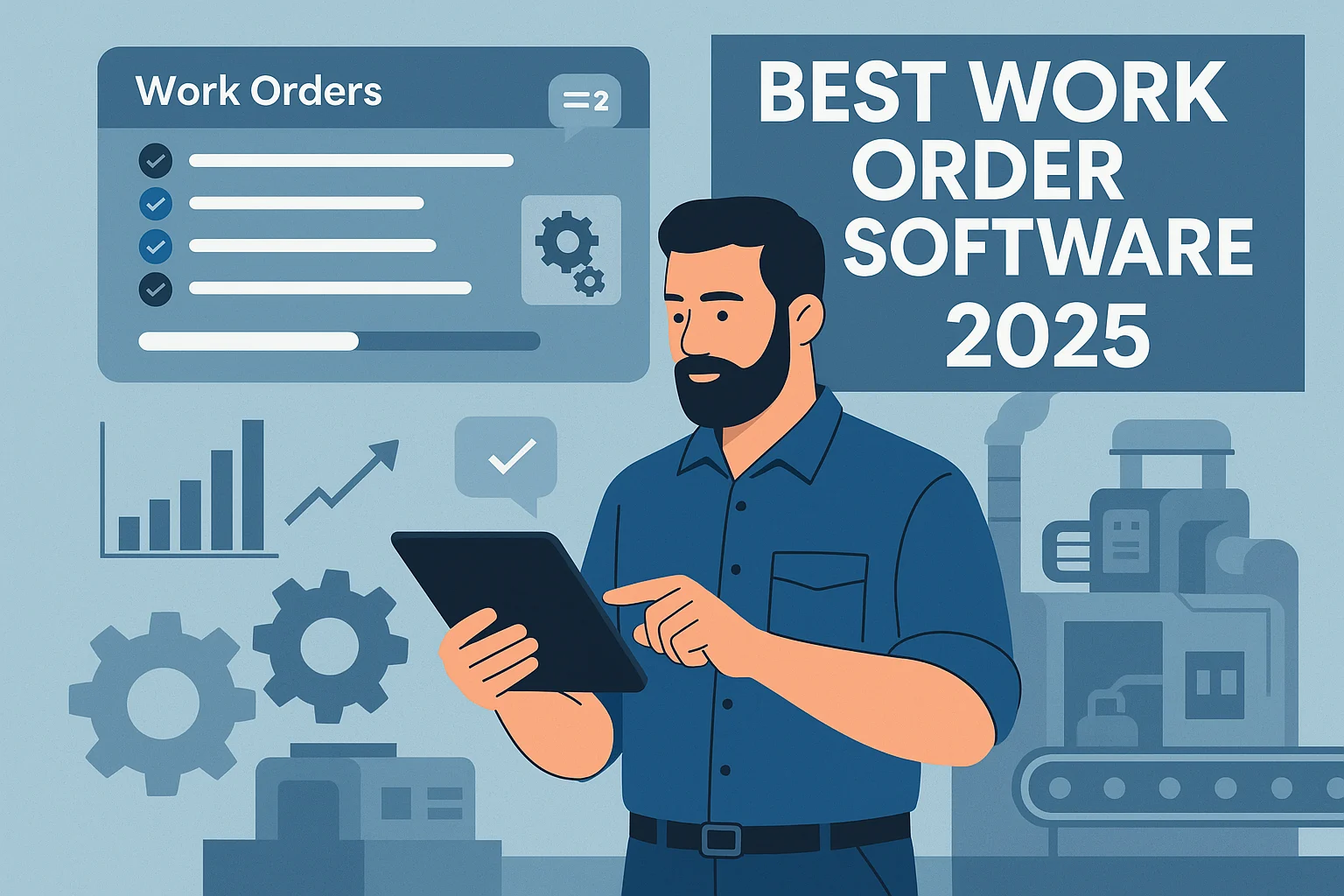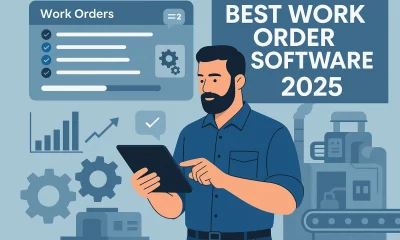Business
How to Automate Desk Booking Systems at a Coworking Space

As the world becomes increasingly digital, the ways we work are rapidly evolving. One such development is the rise of coworking spaces, where freelancers, startups, and remote workers share a common workspace. With this shared space comes the need for efficient desk booking. Automating this process can save both time and money, making it a valuable addition to any coworking space. In this article, we’ll delve into how to automate desk booking at a coworking space.
What are Desk Booking Systems?

Desk Booking Systems, often referred to as hot-desking systems, are digital platforms designed to automate and streamline the reservation of workspace desks. These systems have gained popularity in shared workspaces, such as coworking hubs, where the flexibility of desk usage is paramount.
Rather than assigning permanent desks to individuals, desk booking systems allow for a fluid approach where members or employees can reserve a workspace for specific time slots. With the emergence of more remote and flexible working patterns, these systems cater to a need for adaptability, ensuring that workspace resources are efficiently utilized.
How Does a Desk Booking System Work?
At the heart of modern, flexible workspaces is the desk booking system. Much like how you’d reserve a table at a restaurant or a room in a hotel, this system allows for the seamless reservation of workspace desks.
1. Interface
The gateway to any digital system is its interface, and desk booking systems are no exception.
- Web Portal: Many desk booking systems start with a web-based portal. This is a dedicated website, often with a user-friendly dashboard, allowing members or employees to log in, view available desks, and make reservations.
- Mobile App: In our smartphone-driven world, having a mobile application can be a game-changer. Users can book desks on the go, get push notifications, and sometimes even use the app as a digital key to access the workspace.
- Integrated Software: Larger organizations might have their bespoke software ecosystems. In such cases, desk booking modules can be integrated, offering a unified user experience without the need to hop between different applications.
2. Selection
The power of choice is central to the appeal of desk booking systems.
- Digital Floor Plan: Visualizing the workspace is crucial. Digital floor plans show the layout of the office, marking available and occupied desks. This representation helps users intuitively pick and choose their preferred spot.
- Filter Options: Not all desks are created equal. Some might be close to the window, offering natural light. Others might be in quieter corners, ideal for focused work. Filters allow users to customize their desk search based on specific needs, be it amenities, location, or desk type.
3. Reservation
After choosing the perfect spot, the next step is to make it official. Just like booking a flight or hotel room online, users select their preferred desk and specify the duration of their reservation. Some systems also allow recurring bookings for those who want a specific desk at regular intervals.
4. Confirmation
Post-booking, it’s essential to ensure the user is fully informed.
- Communication Channels: Immediately after a reservation is made, users generally receive a confirmation. This can be via email, containing all the details of the booking, or as a notification on the mobile app.
- QR Codes & Digital Passes: To make access more streamlined, confirmations might come with QR codes or digital passes. Users can simply scan or show these upon arrival, verifying their reservation.
5. Check-in/Check-out
Maintaining order in a flexible workspace is important.
- Check-in: To avoid ‘ghost bookings’ where a desk is reserved but not used, some systems have a check-in feature. Users confirm their presence, either through the app or at a dedicated kiosk in the workspace.
- Check-out: Equally important is the check-out. This marks the end of a user’s reservation, signaling that the desk is available for others. Some systems auto-checkout users once their booking duration is over, while others might require manual check-out.
What are the Benefits of Desk Booking Systems to Coworkers?
1. Flexibility
In a rapidly changing work environment, flexibility has become a cornerstone for productivity. Desk booking systems provide coworkers with the freedom to choose their workspace each day. Instead of being constrained to a fixed spot, they can select spaces based on their specific tasks or moods.
For instance, one might opt for a quiet corner when focused work is on the agenda, or gravitate towards collaborative hubs when teamwork is the call of the day. This dynamic allocation ensures that the workspace becomes a tool tailored to the worker’s immediate needs, rather than a static fixture they must adapt to.
2. Efficiency
Time is a valuable asset, and nothing wastes it quite like wandering around in search of an available desk. In larger coworking spaces, the search can become a cumbersome task. With desk booking systems, coworkers have instant visibility into desk availability.
They can swiftly reserve a spot even before setting foot in the workspace. This proactive approach eliminates the guesswork and aimless wandering, ensuring that coworkers can get settled and start their work promptly. Over time, this efficiency can aggregate into hours, if not days, of saved time.
3. Customization
Every individual has unique work preferences. While some might thrive beside a window with natural sunlight, others might prioritize being close to power outlets for their myriad of gadgets.
Desk booking systems cater to these preferences by offering customization options. Users can filter and choose desks based on various amenities. Want to be close to the coffee machine for those regular caffeine boosts? Or perhaps near a printer for easy access? With the right system, coworkers can tailor their workspace experience, ensuring it aligns perfectly with their needs and work habits.
4. Predictability
While flexibility and spontaneity have their merits, predictability is equally important. Knowing that a reserved desk awaits can be a great source of comfort. With desk booking systems, coworkers can reserve their spots in advance, which means no unexpected surprises or last-minute scrambles for a workspace.
This predictability reduces anxiety and promotes better daily planning. If a worker knows they have a reserved spot in a collaboration hub, they can schedule team meetings with confidence. Similarly, having a quiet desk booked means they can plan deep work sessions without interruptions.
What are the Benefits of Desk Booking Systems for Managers?
1. Space Optimization
One of the fundamental challenges in managing a workspace is ensuring its design aligns with usage patterns. Desk booking systems provide managers with real-time data on which desks or areas are most frequented. If certain zones are consistently popular, it might indicate a preference for certain amenities or settings, such as proximity to windows or the presence of plants.
Conversely, less popular areas might indicate potential issues or unmet needs. With this kind of information at their fingertips, managers can make informed decisions about office layouts, ensuring they are tailored to the preferences and habits of users, thus maximizing the utility of every square foot.
2. Cost Efficiency
Real estate, especially in prime locations, can be a significant cost for businesses. Paying for space that’s underutilized isn’t just wasteful; it’s financially inefficient. Desk booking systems provide a clear picture of desk utilization rates. If certain desks or areas consistently remain unbooked, it might indicate surplus space.
This data-driven insight can guide managers in deciding whether to repurpose that space or even downsize, leading to substantial cost savings. On the flip side, consistently high booking rates might highlight the need for expansion, ensuring that growth decisions are reactive to genuine demand rather than mere speculation.
3. Enhanced Productivity
The physical layout and organization of a workspace play a pivotal role in productivity. A chaotic, overcrowded office can be a hotbed for distractions and interruptions, whereas an orderly, well-allocated space can significantly reduce friction. With desk booking systems, managers ensure that every member has their dedicated space, minimizing disruptions that come with desk searches.
Moreover, the ability to book specific desks means that teams can sit together when collaboration is essential, and individuals can find quiet corners when needed. This fluidity, guided by individual and team needs, fosters an environment where productivity can thrive.
4. Flexibility in Management
Every coworking space or office has its unique culture and rules. Desk booking systems provide managers with the tools to implement and enforce these rules efficiently. For instance, if there’s a policy to prevent desk hogging, managers can set maximum booking durations.
If there’s a need to rotate teams to foster cross-team collaboration, managers can set up booking rotations. The system’s inherent flexibility means that it can be tailored to specific managerial philosophies and objectives, ensuring that the workspace not only serves its users but also aligns with broader organizational goals.
5. Data Insights
Beyond the immediate task of desk bookings, these systems serve as a rich source of data. Through analytics, managers can glean insights into patterns of usage, employee preferences, peak booking times, and other valuable metrics.
This data can help in refining strategies, predicting future needs, and making proactive decisions to enhance the workspace environment. The continuous stream of data ensures that the decision-making process is dynamic and responsive to the evolving needs of the organization and its employees.
Conclusion
Automating desk booking in a coworking space is not merely a matter of convenience; it’s a transformative strategy that can significantly enhance operational efficiency, user experience, and space optimization. By leveraging technology, coworking spaces can ensure a seamless reservation process, reduce manual errors, and gain valuable insights into workspace utilization.
As the demand for flexible workspaces continues to grow, it becomes imperative for such spaces to adopt smart and automated solutions. Embracing automated desk booking is not just about staying relevant in an evolving market but also about creating an environment where productivity and innovation can thrive unhindered. Whether you manage a coworking space or are a patron, the benefits of this automation are manifold and well worth the investment.

Business
The Importance of Local SEO 2025: Boosting Visibility & Driving Growth

In present hyper-connected world, simply having a website isn’t enough—local visibility is everything. Whether you’re running a coffee shop in Bristol or offering plumbing services in Chicago, your ability to show up in local search results can make or break your business. That’s where Local SEO steps in.
As of 2025, over 78% of location-based searches on mobile lead to an offline purchase, proving that consumers are searching locally with the intent to act quickly. For small businesses, local SEO is no longer a luxury—it’s a necessity for growth, trust, and survival in a competitive digital landscape.
What Is Local SEO?
Local SEO (Search Engine Optimization) is a digital marketing strategy focused on improving a business’s visibility in geographically-related search results, particularly on Google. Unlike traditional SEO, which targets a global or national audience, local SEO helps your business rank when users search for services “near me” or include a specific city, town, or neighborhood in their query.
In 2025, local SEO revolves around optimizing your Google Business Profile, ensuring NAP (Name, Address, Phone Number) consistency across directories, earning positive reviews, and using geo-targeted keywords. With over 46% of all Google searches now having local intent, local SEO is essential for attracting nearby customers, increasing foot traffic, and building trust in your local community.
Whether you run a bakery in Manchester or a law firm in Brooklyn, local SEO ensures you’re found when it matters most—right in your customer’s neighborhood.
Why Local SEO Is Important?
In 2025, local SEO is more vital than ever, as consumer behavior shifts towards hyper-local, instant search experiences. Here’s why it matters—and what the latest data reveals:
1. Rise of “Near Me” Searches
Searches containing “near me” have grown by more than 150% in the past two years, according to Google Trends. People now expect instant, localized results. Local SEO ensures your business ranks for these intent-driven searches, allowing you to capture nearby users looking for products or services they need immediately, increasing leads, calls, and walk-in visits dramatically.
2. Mobile Search Dominance
As of 2025, over 65% of local searches come from smartphones. Consumers use mobile to find local businesses, check reviews, get directions, and contact services on the go. Local SEO helps ensure your business is fully optimized for mobile results, improving your Google Maps placement and capturing high-intent users who are ready to act quickly after finding your business.
3. High Purchase Intent of Local Searches
Local SEO targets users with strong purchase intent. Research from BrightLocal reveals that 78% of local mobile searches result in a purchase or store visit within 24 hours. By showing up in relevant local searches, your business connects directly with ready-to-buy customers—making local SEO one of the highest ROI strategies for small and location-based businesses in 2025.
4. Voice Search Growth in Local Discovery
Voice assistants like Siri, Alexa, and Google Assistant are transforming local search. As of 2025, 58% of users rely on voice search to find local businesses. Queries like “best pizza place near me” or “24-hour vet nearby” are common. Local SEO ensures your business is voice-friendly, increasing discoverability for location-based, conversational search queries used daily on smart devices.
5. Google Maps as a Primary Discovery Tool
Google Maps has become the default tool for finding local businesses. In 2025, over 84% of users turn to Maps for directions, hours, or reviews. Without local SEO—especially a well-optimized Google Business Profile—your business may not appear at all. Proper optimization ensures you’re visible in local packs and map results where purchasing decisions happen in real time.
6. Impact of Reviews on Local SEO Rankings
Customer reviews are a major ranking signal in Google’s local algorithm. According to Whitespark’s 2025 report, reviews influence 16% of local pack rankings. High ratings, review frequency, and owner responses increase credibility and boost visibility. A strong local SEO strategy includes review generation and response management, helping businesses build trust and gain better placement in search results.
7. Local SEO Builds Brand Trust and Authority
Local SEO helps establish your business as a trustworthy local authority. A BrightLocal study shows 87% of users read reviews before engaging with a business. Verified listings, accurate contact details, quality content, and consistent branding across directories all contribute to higher trust and user confidence—crucial for conversions and long-term customer relationships in your local market.
Benefits of Local SEO
1. Increased Visibility in Local Search Results
Local SEO boosts your presence on Google Maps and in the “Local Pack,” which appears above organic listings. In 2025, over 84% of users click on local results when searching for nearby services. By optimizing your Google Business Profile and local keywords, your business appears where customers are looking—right in your service area.
2. More Foot Traffic and Local Engagement
Optimizing for local SEO drives real-world results. Google data shows 76% of users who conduct a local search visit a business within 24 hours. Accurate location info, mobile-friendly sites, and map listings guide customers directly to your storefront, significantly increasing in-store visits and personal engagement with high-intent local shoppers and clients.
3. Higher Conversion Rates from Local Searchers
Local searchers have strong intent to buy. According to BrightLocal, 78% of location-based searches result in purchases. Local SEO positions your business in front of customers who are actively seeking what you offer. This leads to faster conversions, higher-quality leads, and better ROI compared to untargeted traffic from generic or broad keyword campaigns.
4. Improved Online Reputation and Trust
Reviews are essential in local SEO. A 2025 ReviewTrackers study shows that 87% of consumers won’t consider a business with low ratings. Local SEO includes review management and response strategies, which enhance trust, increase credibility, and influence decision-making—leading to more clicks, bookings, and sales from new and returning customers.
5. Competitive Advantage Over Local Rivals
Many small businesses still overlook local SEO, giving you a chance to stand out. By optimizing your listings, content, and citations, you can outrank nearby competitors in search results. This improved visibility helps attract more customers in your area, even if competitors offer similar products or services but lack strong digital presence.
6. Cost-Effective Marketing Strategy
Local SEO provides long-term, sustainable exposure without the ongoing costs of ads. Once optimized, your listings and rankings continue to drive organic traffic. In 2025, small businesses using local SEO report 60% lower cost per acquisition compared to paid ads. It’s one of the most efficient ways to grow locally without draining your budget.
7. Boosts Local Brand Awareness
Appearing in multiple local searches helps reinforce your brand name and presence within your community. Whether someone sees your business on Google, a directory, or in reviews, repeated exposure builds recognition. Local SEO ensures your brand shows up consistently in all local digital touchpoints, making your business top-of-mind for nearby consumers.
How Local SEO Works?
Local SEO works by optimizing your online presence so that search engines—especially Google—understand your business’s location, services, and relevance to local searchers. It helps your business appear in key places like Google’s Local Pack, Google Maps, and localized organic search results when people search for nearby solutions.
How Local SEO works?
1. Google Business Profile Optimization
Claiming and optimizing your Google Business Profile (GBP) is the foundation. You must ensure your address, phone number, business hours, categories, and photos are accurate and up to date. According to a 2025 Whitespark study, GBP signals are the #1 ranking factor for Google’s Local Pack results.
2. NAP Consistency Across Listings
Search engines scan business directories (like Yelp, Facebook, Bing Places) to verify your Name, Address, and Phone Number (NAP). Consistency builds trust. Inconsistencies can confuse Google and lower your rankings. Tools like Moz Local and BrightLocal help automate and audit citation consistency across the web.
3. Local Keyword Targeting
Local SEO involves targeting geo-specific keywords like “best Italian restaurant in Glasgow” or “emergency plumber near me.” You integrate these keywords into your website pages, blog posts, meta tags, and headings to signal to Google that you’re a relevant match for local intent searches.
4. Online Reviews and Ratings
Customer reviews, especially on Google, directly influence your rankings. Positive reviews improve click-through rates and trust. Responding to reviews is equally important—it signals engagement and reliability. In 2025, reviews account for over 16% of local search ranking factors (Whitespark).
5. Local Backlinks and Citations
Backlinks from local websites, news sites, or blogs strengthen your local authority. Additionally, local citations (mentions of your business name and details) across trusted directories reinforce your legitimacy and boost visibility in Google’s local search algorithm.
6. Mobile and Voice Search Optimization
With over 65% of local searches coming from mobile devices and 58% from voice assistants in 2025, your website must be mobile-friendly, fast-loading, and structured with clear answers to conversational queries (e.g., “Where’s the nearest vet clinic open now?”).
7. Location-Based Content
Creating content that speaks directly to your community—like neighborhood pages, local blogs, or city-specific landing pages—helps you rank higher in local results. This tells Google that your site is relevant not just to what users are searching, but where they’re searching from.
How to Do Local SEO?
1. Claim and Optimize Your Google Business Profile
Start by claiming your Google Business Profile (GBP) through Google’s official platform. Fill out every detail including your business name, address, phone number, category, working hours, and website URL. Upload high-quality images and videos, post regular updates, and respond to customer questions. In 2025, fully optimized profiles are 7x more likely to get clicks and 70% more likely to lead to in-store visits compared to incomplete listings.
2. Ensure NAP Consistency Across All Platforms
NAP stands for Name, Address, and Phone number—and consistency is critical across your website, local directories, and social platforms. Inconsistent contact information confuses both users and Google’s algorithm, lowering your local ranking potential. Use tools like Moz Local or BrightLocal to audit and fix discrepancies. Accurate citations help Google trust your business and boost your visibility in local search results.
3. Target Local Keywords Strategically
Local SEO relies heavily on geo-targeted keywords such as “best bakery in Bristol” or “24-hour locksmith near me.” Use SEO tools like Google Keyword Planner or Semrush to research high-intent local phrases. Integrate these keywords naturally into your website content, service pages, meta descriptions, and your Google Business Profile. This improves your chances of ranking for location-specific queries made by nearby customers.
4. Get Listed in Trusted Local Directories
Submitting your business to high-authority local directories like Yelp, Bing Places, Foursquare, Yellow Pages, and Facebook boosts your visibility. These listings act as digital citations and help build local authority. Make sure all listings match your NAP format exactly and include categories, services, and links to your website for better ranking in Google’s local pack and Maps results.
5. Collect and Manage Online Reviews
Online reviews are a powerful ranking and trust factor. Encourage satisfied customers to leave Google reviews, and actively respond to feedback, both positive and negative. In 2025, businesses with over 50 recent reviews enjoy significantly higher visibility. Reviews not only build credibility but also influence consumer decisions, so monitor and manage them through tools like ReviewTrackers or Google’s review dashboard.
6. Optimize Your Website for Local SEO
Your website should clearly reflect your business’s location and offerings. Create location-specific landing pages, use local schema markup, embed Google Maps, and include your full NAP on every page. Ensure your site is mobile-friendly and loads fast, as 65% of local searches come from mobile devices. Google prioritizes user experience, especially for local intent searches.
7. Build Local Backlinks and Earn Citations
Earning backlinks from local sources like news sites, blogs, schools, and community pages improves your local SEO authority. Participate in or sponsor local events to get mentioned in regional publications. Also, increase your citations—mentions of your business details without links—on trustworthy directories. These signals help Google verify your physical presence in the area and improve your ranking.
8. Create Hyperlocal and Relevant Content
Publishing local content builds relevance with your community and search engines. Write blog posts about area-specific challenges, local events, customer stories, or “how-to” guides related to your services in your city. This positions your business as an active, relevant local resource while helping your site rank for long-tail, location-specific queries that drive qualified traffic.
9. Use Dedicated Location Pages for Multiple Branches
If your business operates in more than one area, create unique landing pages for each location. Include localized content, reviews, maps, and service details. Avoid duplicate content—tailor each page to reflect the community it serves. Adding schema markup and localized keywords ensures each location ranks individually and accurately in the relevant city or neighborhood.
10. Track, Analyze, and Improve with Local SEO Tools
Use tools like Google Search Console and Google Analytics 4 to track your local traffic, user behavior, and conversions. Platforms like BrightLocal, Whitespark, or Semrush Local offer advanced tracking for rankings, citations, reviews, and competitor analysis. Regularly auditing and updating your local SEO efforts helps you adapt to algorithm changes and maintain long-term visibility.
Top Local SEO Tools & Resources
1. Google Business Profile Manager
Google Business Profile (GBP) Manager is the backbone of local SEO. According to Google, listings with complete profiles receive 7x more clicks and 70% more direction requests than incomplete ones. In 2025, GBP directly influences visibility in the Local Pack, which now accounts for 42% of all local clicks. Posting updates, replying to reviews, and using GBP insights help improve real-world footfall and search rankings.
2. BrightLocal
BrightLocal is used by over 80,000 agencies and local businesses to manage citations, monitor reviews, and track local rankings. Its Local Search Grid feature provides visual insight into how your business ranks in specific areas. A 2025 survey shows that businesses using BrightLocal see an average increase of 32% in local keyword visibility within 3 months of consistent optimization efforts.
3. Moz Local
Moz Local automates listing management across dozens of directories, helping businesses maintain accurate NAP data. In 2025, Moz’s citation sync reduces manual errors by over 90% and improves local search stability across platforms like Yelp, Apple Maps, and Bing. A Moz study shows that businesses with consistent NAP data experience 28% better ranking outcomes in Google’s Local Pack.
4. Semrush Local SEO Toolkit
Semrush’s Local SEO Toolkit is integrated into its broader SEO suite, used by 10 million marketers globally. In 2025, its AI-driven auditing and geo-targeted trackingwill provide up to 96% keyword accuracy for local ranking data. A recent case study showed that small businesses using Semrush’s local features improved local organic traffic by 40% within 60 days.
5. Whitespark
Whitespark’s Local Citation Finder helps businesses uncover directories and platforms that competitors are listed on, but they are not. In 2025, Whitespark clients reported a 24% improvement in local search rankings after citation cleanup and discovery campaigns. It also offers Google Review Link Generators, making it easier to get customer reviews—a key local ranking factor.
6. Yext
Yext manages your business data across more than 200 platforms, including Amazon Alexa, Apple Maps, Facebook, and Waze. Research from Yext shows that consistent data across listings improves search engine trust signals by over 35%, which directly affects Local Pack rankings. It’s ideal for multi-location businesses that require high-scale automation and brand control.
7. ReviewTrackers
In 2025, 93% of consumers say online reviews influence buying decisions (Source: ReviewTrackers). This tool allows businesses to monitor, collect, and respond to reviews from Google, Facebook, Yelp, and more—all from one dashboard. Sentiment analysis and competitor benchmarks help brands improve their reputation and boost click-through rates by up to 25% in local search results.
8. Local Falcon
Local Falcon maps your Google Business Profile ranking position across a grid of search points in a specific area. This reveals your real-world local SEO coverage radius, which is increasingly important in 2025’s proximity-based algorithm. Businesses using Local Falcon typically discover 15–30% of their service areas are underperforming, allowing them to optimize hyperlocal visibility more precisely.
Common Mistakes to Avoid in Local SEO
1. Inconsistent NAP (Name, Address, Phone Number) Details
One of the most damaging mistakes in local SEO is having inconsistent business information across directories and platforms. Google relies on consistent NAP data to validate your legitimacy. In 2025, businesses with mismatched citations saw a 22% drop in local rankings (Source: Whitespark). Always ensure your NAP is identical across your website, Google Business Profile, Yelp, and other directories.
2. Neglecting Google Business Profile Optimization
Simply claiming your Google Business Profile isn’t enough. Many businesses forget to update hours, add new photos, or respond to Q&A and reviews. This hurts engagement and visibility. A BrightLocal study shows that optimized profiles receive 5x more views and 3x more actions (calls, clicks, direction requests) compared to inactive or incomplete listings.
3. Ignoring Online Reviews and Reputation Management
Failing to manage reviews—or worse, not generating them—directly affects your local visibility. In 2025, Google confirmed that review quality, quantity, and recency are critical ranking signals. Businesses with fewer than 10 recent reviews rank significantly lower in competitive niches. Actively ask for feedback, reply to every review, and monitor your reputation.
4. Overlooking Mobile Optimization
With over 65% of local searches coming from mobile devices in 2025, having a slow or unresponsive website drives users—and rankings—away. Google prioritizes mobile-first indexing, meaning your mobile experience directly impacts your SEO performance. Ensure your site loads under 3 seconds, is responsive, and features click-to-call buttons and map integrations.
5. Using Generic, Non-Localized Content
Generic content that doesn’t target specific locations fails to rank in local results. Many businesses make the mistake of reusing the same content across city pages or not including local references at all. To rank well, create unique, geo-targeted landing pages with references to neighborhoods, landmarks, or local events relevant to your audience.
6. Keyword Stuffing and Spammy Optimization
Stuffing location names or service keywords excessively in your content or Google Business Profile can backfire. Google’s spam filters in 2025 are more advanced and may flag your listing, reducing visibility or even suspending your profile. Instead, use keywords naturally, prioritizing helpful content that addresses users’ local intent.
7. Not Using Local Structured Data (Schema Markup)
Schema markup helps Google better understand your business’s address, services, and reviews. Many businesses skip this technical step, missing out on rich results like review stars or operating hours in search. In 2025, websites with local business schema had 28% higher click-through rates, according to a study by Schema.org.
8. Failing to Monitor Performance and Analytics
Local SEO isn’t set-and-forget. Failing to track your performance using tools like Google Search Console, GA4, or BrightLocal means missing valuable insights. Regularly reviewing rankings, click-through rates, and user behavior helps identify weak spots and areas to improve. In 2025, top-performing local businesses review and update their SEO strategy at least quarterly.
Conclusion
In 2025, local SEO is no longer optional—it’s essential for small and location-based businesses aiming to grow in competitive markets. From improving visibility in Google Maps to driving foot traffic and building trust through reviews, local SEO delivers real, measurable results.
Apps and Software
Best Work Order Software for Maintenance Efficiency

In present fast-moving industrial and facility environments, maintenance teams can no longer rely on paper-based systems or manual tracking. Work order software has become an essential tool in 2025, enabling businesses to streamline operations, reduce downtime, and optimize asset performance with ease. These digital platforms automate the creation, assignment, and tracking of maintenance tasks—saving time, minimizing errors, and boosting accountability.
With the rise of mobile-first solutions, IoT integrations, and AI-driven scheduling, work order software is now central to achieving maintenance efficiency across manufacturing plants, commercial buildings, utilities, and service sectors. In this guide, we review the 10 best work order software platforms that are redefining maintenance management in 2025.
What Is Work Order Software?
Work order software is a centralized digital platform used to generate, assign, and track maintenance tasks across facilities, equipment, or assets. It simplifies workflows by automating job requests, scheduling preventive maintenance, and maintaining a detailed log of repairs and service history. As of 2025, over 68% of maintenance teams worldwide have adopted work order systems to replace outdated paper-based or spreadsheet tracking methods (Source: Statista Maintenance Tech Trends 2025).
These platforms now feature cloud-based access, mobile integration, AI-driven task prioritization, and IoT connectivity, enabling real-time updates and predictive maintenance. Industries like manufacturing, healthcare, logistics, and utilities rely on this software to cut unplanned downtime by up to 30% and improve asset lifecycle management.
Why Using Of Work Order Software Matter?
1. Reduces Equipment Downtime
Work order software minimizes unplanned equipment failures by enabling timely repairs and preventive maintenance. In 2025, businesses report up to a 40% reduction in downtime, which boosts production output, lowers emergency repair costs, and enhances overall operational efficiency across manufacturing, logistics, and facility management sectors.
2. Improves Preventive Maintenance Compliance
Automated scheduling through work order software ensures preventive maintenance tasks are performed consistently. This results in a 25% improvement in compliance rates and extends asset lifespan, helping organizations avoid reactive repairs, reduce equipment stress, and better adhere to manufacturer service intervals and safety inspection timelines.
3. Centralizes Maintenance Records
Work order software creates a centralized digital repository for maintenance history, parts usage, technician performance, and cost tracking. These records are invaluable for audits, warranty claims, and root cause analysis. It helps teams maintain transparency, regulatory compliance, and better decision-making through accessible and organized maintenance data.
4. Enhances Workforce Accountability
Digital work order assignment allows managers to track technician activity, job status, and time to completion. This improves workforce accountability by identifying inefficiencies and rewarding productivity. Teams work more cohesively with clear expectations, reducing miscommunication and ensuring no maintenance task is overlooked or delayed.
5. Supports Data-Driven Decision Making
Modern work order platforms feature built-in analytics and reporting tools. These insights help managers monitor KPIs, detect recurring issues, and optimize labor and material usage. In 2025, data-driven maintenance strategies can reduce annual maintenance costs by up to 20% across asset-heavy industries like manufacturing and energy.
5 Best Work Order Software in 2025
1. UpKeep
UpKeep is a top-rated, mobile-first work order software designed to streamline maintenance operations and asset management. Trusted by over 4,000+ companies worldwide, it’s known for ease of use, robust mobile access, and fast implementation. In 2025, UpKeep reports that teams using its platform see a 30% increase in technician productivity and 26% fewer equipment failures due to proactive task scheduling.
It supports cloud-based deployment, offline functionality, and integrates with QuickBooks, Slack, and Zapier, making it a go-to for maintenance teams in facilities, manufacturing, and property management sectors.
Key Features:
- Mobile-First Work Order Management: Create, assign, and close work orders from smartphones with real-time updates and offline capabilities for field-based teams.
- Preventive Maintenance Scheduling: Automate recurring tasks with customizable PM templates, reducing reactive maintenance and improving asset reliability over time.
- Asset Management & History Tracking: Link work orders to equipment, track repair logs, and monitor asset lifecycle to support smarter maintenance decisions.
- Inventory & Spare Parts Tracking: Manage inventory levels, receive low stock alerts, and streamline reordering directly from the platform to avoid stockouts.
- In-App Messaging & Collaboration: Communicate directly within work orders to reduce miscommunication and speed up response times across teams and supervisors.
- Analytics & Maintenance Reporting: Gain visibility into key KPIs like mean time to repair (MTTR), technician productivity, and asset performance through interactive dashboards.
Free Plans Include:
- Access for 1 user only
- Unlimited work orders
- Basic asset and location tracking
- Limited reporting and no integrations
- Available on mobile and desktop
Potential Drawback
UpKeep’s lower-tier plans have limited reporting, user restrictions, and no API access, which may not suit larger or highly regulated operations.
Industries Using UpKeep:
- Manufacturing
- Property Management
- Facilities & Building Maintenance
- Hospitality
- Healthcare & Hospitals
- Education Institutions
- Warehousing & Logistics
Best Suited For
UpKeep is best for small to mid-sized teams that need a fast, mobile, and affordable solution to digitize work orders and preventive maintenance. Ideal for businesses with field technicians or distributed assets seeking to boost efficiency with minimal training.
2. Fiix by Rockwell Automation
Fiix is an AI-powered, cloud-based work order and CMMS platform built by Rockwell Automation. Designed for industrial-scale asset management, it simplifies maintenance workflows through smart scheduling, ERP/IoT integrations, and predictive analytics. In 2025, companies using Fiix have seen a 32% decrease in equipment failures and 25% faster task resolution.
Its drag-and-drop calendar, custom dashboards, and mobile app make it a powerful tool for teams managing complex, multi-site maintenance. With open API connectivity, Fiix easily syncs with SAP, Oracle, and SCADA systems, helping enterprises move toward smarter, data-driven maintenance strategies across manufacturing, utilities, and energy sectors.
Key Features:
- AI-Powered Work Order Scheduling: Automates prioritization based on asset health, technician availability, and historical data for smarter maintenance planning.
- Mobile Maintenance Management: Technicians access work orders, checklists, and asset details on the go via the Fiix mobile app—even offline.
- Asset Performance Analytics: Advanced dashboards track equipment health, downtime patterns, and cost analysis to inform smarter capital planning.
- Integration with ERP & IoT Systems: Seamless integration with ERP, SCADA, and condition-monitoring tools enhances workflow automation and real-time alerts.
- Work Order Templates & Escalations: Pre-built templates and escalations streamline task creation and ensure compliance with SLAs or regulatory standards.
Free Plans Include:
- Limited to 3 users
- 25 active work orders/month
- Basic asset tracking & parts management
- Community support only
Potential Drawback
Slight learning curve for non-technical users, and higher-tier features like AI scheduling are available only in premium plans.
Industries Using Fiix:
- Manufacturing
- Food & Beverage
- Energy and Utilities
- Heavy Equipment
- Pharmaceuticals
Best Suited For
Fiix is best suited for large enterprises, manufacturers, utilities, and energy providers seeking predictive maintenance capabilities and full ERP/IoT integration. It’s ideal for businesses with complex compliance needs, large maintenance teams, and multiple facilities that need real-time insights and centralized management.
3. Limble CMMS
Limble CMMS is a cloud-based work order and maintenance platform known for its ease of use, rapid deployment, and strong mobile functionality. It enables preventive maintenance automation, asset tracking, technician performance monitoring, and custom KPI dashboards. As of 2025, businesses using Limble report a 34% increase in task completion speed and 27% drop in reactive maintenance costs.
With QR code integration, multilingual support, and unlimited custom fields, it’s highly adaptable across industries. Limble’s clean UI and responsive customer service make it a top pick for teams wanting a fast, scalable solution that improves visibility, uptime, and maintenance compliance.
Key Features:
- Automated Preventive Maintenance: Set schedules, assign recurring tasks, and reduce emergency breakdowns with flexible PM automation tools.
- Custom Dashboards & KPIs: Configure performance metrics, charts, and goals to match your team’s needs and benchmark asset reliability.
- QR Code-Based Asset Tracking: Scan asset tags to instantly pull up history, work orders, manuals, and parts—reducing search time by up to 40%.
- Multi-Language & Multi-Site Support: Ideal for global teams managing maintenance across multiple buildings and languages.
- Work Request Portal for Staff: Non-maintenance staff can submit and monitor requests without needing a full account or training.
Free Plans Include:
- Free 30-day trial only
- Full feature access during trial
- No long-term free plan
Potential Drawback
Higher-tier pricing may be prohibitive for small businesses; customization options may require onboarding help.
Industries Using Limble:
- Hospitality
- Education
- Healthcare
- Warehousing
- Government Facilities
Best Suited For
Limble is ideal for mid-sized organizations and facility teams in hospitality, education, healthcare, government, and warehousing sectors. It’s especially effective for businesses needing multi-location support, fast onboarding, mobile task management, and strong customer assistance without sacrificing customization or analytics.
4. MaintainX
MaintainX is a mobile-first work order and operations platform designed to simplify maintenance, inspections, and SOP execution. In 2025, it’s trusted by over 10,000 companies, helping them improve communication, compliance, and asset tracking. Teams using MaintainX report a 40% improvement in team coordination due to its built-in chat and real-time update features.
MaintainX supports unlimited work orders (even on free plans), offline mobile use, and document attachment (manuals, checklists, SOPs). It’s especially useful for field service operations, hospitality, retail chains, and multi-site facilities looking to digitize maintenance without overwhelming complexity.
Key Features:
- Unlimited Work Orders: Even on free plans, create and manage unlimited tasks for better responsiveness and operational agility.
- Mobile Chat within Work Orders: Communicate with technicians directly inside task threads—no more switching between apps.
- Digital SOPs & Checklists: Attach standard operating procedures, inspections, or safety protocols directly into work orders.
- Offline Mobile Mode: Field technicians can work without a connection, and changes sync once back online.
- Work History & Compliance Logs: Keep accurate records for audits, safety inspections, and maintenance trend analysis.
Free Plans Include:
- Unlimited work orders & assets
- Up to 5 users
- Access to mobile app, SOPs, and history
- Limited reporting and no integrations
Potential Drawback
Limited functionality in the desktop version; some advanced analytics only available in paid plans.
Industries Using MaintainX:
- Retail Chains
- Hospitality
- Logistics
- Utilities
- Commercial Cleaning
Best Suited For
MaintainX is best suited for retail operations, hospitality groups, logistics companies, and facilities with field-based or mobile teams. It excels in fast-paced environments where real-time communication, compliance checks, and mobile-first execution are critical. Perfect for companies that value simplicity, collaboration, and modern mobile UX.
5. eMaint CMMS by Fluke
eMaint is a robust enterprise-grade CMMS developed by Fluke, offering extensive customization, predictive analytics, and deep compliance features. In 2025, eMaint supports over 50,000 global users and enables a 15–20% reduction in total maintenance spend through its proactive, data-driven features. With multi-site scalability, condition monitoring, and detailed escalation workflows, it serves asset-heavy sectors needing high reliability.
The platform supports ISO compliance, integrates with SCADA and GIS, and provides powerful reporting tools for MTTR, MTTF, and downtime metrics. It’s a premier choice for operations requiring centralized control, advanced planning, and industry-grade safety and audit readiness.
Key Features:
- Condition-Based Maintenance: Triggers work orders from real-time asset data, reducing manual inspections and unplanned breakdowns.
- Multi-Site & Role-Based Access: Enables centralized control over decentralized operations with granular user permissions.
- Work Order Escalation Rules: Automatically escalate overdue or high-priority tasks to ensure quick resolution and accountability.
- Custom Reports & KPIs: Build dashboards to measure MTTR, MTTF, and maintenance backlog trends across teams or assets.
- Integrated Parts & Vendor Management: Streamline procurement workflows with supplier tracking and parts usage history linked to each work order.
Free Plans Include:
- Free demo only
- No long-term free tier
- Custom quote-based pricing
Potential Drawback
Complex to implement; may require extensive training and configuration for non-enterprise users.
Industries Using eMaint:
- Energy & Utilities
- Aviation
- Government Facilities
- Manufacturing
- Pharmaceuticals
Best Suited For
eMaint is best suited for large-scale enterprises, government agencies, aviation, pharmaceuticals, and energy sectors that demand high configurability, audit-compliance, advanced analytics, and integration with industrial systems. It’s ideal for organizations prioritizing long-term asset optimization, failure prediction, and enterprise-wide maintenance visibility.
Benefits of Using Work Order Software
1. Streamlined Maintenance Scheduling
Work order software automates recurring maintenance and task prioritization. In 2025, companies using automated scheduling report a 28% reduction in maintenance planning time. This ensures high-priority tasks are never missed, improving team coordination and minimizing costly unplanned downtime across operations.
2. Real-Time Task Tracking
With real-time dashboards and mobile notifications, managers can instantly view task status and technician activity. According to a 2025 CMMS user survey, real-time tracking improves job completion rates by 35%, enhancing accountability and reducing delays caused by communication gaps or unclear work assignments.
3. Asset Lifecycle Optimization
Digital work orders maintain detailed service logs for each asset, supporting better repair-or-replace decisions. In 2025, organizations leveraging this data-driven approach have extended asset life by up to 20%, according to industry benchmarks, reducing capital expenditure and boosting long-term maintenance ROI.
4. Enhanced Technician Productivity
Technicians equipped with mobile work order apps complete tasks faster due to instant access to instructions, manuals, and images. A 2025 field study shows that teams using mobile work order software improved task efficiency by 32%, reducing travel time, miscommunication, and tool downtime.
5. Improved Inventory Management
Integrated inventory tracking within work order software alerts teams when parts are low, enabling timely reordering. According to Gartner’s 2025 Supply Chain Tech Report, companies using real-time inventory features experience 24% fewer part shortages, helping to reduce repair delays and stock-related service interruptions.
Types of Work Order Software
1. Standalone Work Order Software
Standalone work order tools focus purely on digitizing task creation, assignment, and tracking without the complexity of a full CMMS. They are cost-effective, easy to deploy, and ideal for small businesses looking to move away from spreadsheets or paper logs.
In 2025, nearly 38% of small maintenance teams still rely on standalone systems for scheduling and real-time task updates. These tools typically offer mobile access, basic asset linking, and in-app communications. However, they may lack advanced inventory or analytics functions. Examples: UpKeep Basic, MaintainX Free. Best For: Small teams, retail stores, janitorial services
2. CMMS-Based Work Order Software
Computerized Maintenance Management Systems (CMMS) offer robust work order functionality integrated with asset management, preventive scheduling, spare parts inventory, and analytics. In 2025, over 62% of mid to large-scale facilities use CMMS-based platforms to reduce downtime, track KPIs like MTTR, and improve technician productivity.
These systems are scalable, configurable, and often used across manufacturing, education, and healthcare sectors. CMMS software also supports compliance, audit trails, and vendor tracking. Examples: Limble CMMS, eMaint, Hippo CMMS. Best For: Manufacturing, healthcare, warehouses, universities
3. ERP-Integrated Work Order Modules
These tools are embedded within or connect to Enterprise Resource Planning (ERP) systems, offering end-to-end visibility between maintenance, finance, procurement, and operations. In 2025, companies using ERP-integrated solutions report a 15–20% improvement in asset cost control due to linked budgeting and inventory modules.
Though complex to implement, these platforms enable unified workflows and cross-department insights. Common in large enterprises, they support service-level agreements, purchase order automation, and compliance reporting. Examples: SAP PM Module, Oracle NetSuite Maintenance, Infor EAM. Best For: Enterprises, logistics, automotive, oil & gas sectors
4. Mobile-First Work Order Apps
Mobile-first work order apps are built for technicians in the field, enabling them to create, update, and complete tasks via smartphones or tablets. In 2025, over 70% of technicians globally prefer mobile apps for real-time updates, photo attachments, and offline access.
These platforms increase technician efficiency, reduce paperwork, and improve task visibility. They’re often integrated with cloud platforms and include features like in-app messaging and SOP checklists. Examples: MaintainX, UpKeep, Fiix Mobile. Best For: Field service teams, property managers, hospitality, utilities
5. IoT-Integrated Smart Maintenance Platforms
These advanced systems generate work orders automatically based on real-time data from sensors, meters, or connected machines. IoT-integrated platforms support condition-based and predictive maintenance, reducing equipment failure by up to 40%, according to 2025 industrial studies.
They enable alerts when anomalies are detected, improve uptime, and extend asset life through precision monitoring. These solutions are typically used in smart factories or industries with high-value, continuous-use machinery. Examples: Fiix with IoT Hub, IBM Maximo Application Suite. Best For: Manufacturing 4.0, utilities, mining, energy sectors
How to Choose the Right Work Order Software
1. Assess Your Business Size and Complexity
Start by evaluating the scale and scope of your operations. Small teams may need basic tools for task tracking, while large enterprises require CMMS or ERP integrations. In 2025, over 60% of SMEs opt for mobile-first platforms, while enterprise users demand automation, asset hierarchies, and compliance management across multiple sites.
2. Check for Industry-Specific Features
Select software that offers features tailored to your sector. Manufacturing may require machine performance tracking, while healthcare needs compliance modules. Industry-aligned tools reduce customization time and increase efficiency. Many top platforms in 2025 provide templates and modules pre-configured for industries like logistics, education, facilities, and food & beverage manufacturing.
3. Evaluate Mobile and Offline Capabilities
A mobile-first platform is vital for technicians working in the field. Ensure the app works offline, syncs data automatically, and offers real-time updates. In 2025, 70% of maintenance teams rate mobile usability as a key factor. It boosts technician efficiency, reduces paperwork, and enhances visibility into remote or multi-site maintenance operations.
4. Ensure Integration with Existing Systems
Choose a system that integrates easily with your existing tools—ERP, HR, procurement, or inventory software. Platforms with APIs or plug-and-play connectors reduce manual data entry and support automation. In 2025, companies integrating work order software with business systems see up to 25% efficiency gains across maintenance, finance, and purchasing workflows.
5. Review User Interface and Training Needs
Ease of use is essential to maximize adoption. Opt for intuitive interfaces with clear navigation and drag-and-drop schedulers. Also, check if the vendor offers onboarding, tutorials, or live support. In 2025, systems like Limble and UpKeep report over 90% user adoption in the first month due to their user-friendly UI.
6. Check Reporting and KPI Tracking
Look for platforms that offer real-time dashboards and maintenance KPIs like MTTR, MTTF, and asset costs. Data-rich insights help optimize preventive maintenance and workforce performance. According to 2025 industry reports, organizations using KPI-driven dashboards reduce downtime by 20% and make more informed capital replacement decisions across equipment and assets.
7. Compare Pricing, Licensing, and Scalability
Understand the pricing model—per user, per asset, or per site. Make sure the platform scales as your team grows. Compare feature tiers, free trials, and long-term costs. Scalable systems with modular upgrades prevent costly migrations. In 2025, flexible pricing and future-ready scalability are top considerations for IT and operations leads.
Conclusion
Choosing the right work order software is essential for boosting maintenance efficiency, reducing downtime, and extending asset life in 2025. Whether you manage a small facility or a multi-site industrial operation, today’s top platforms offer scalable, mobile, and intelligent solutions tailored to your needs. By evaluating key features—like preventive scheduling, mobile access, asset tracking, and analytics—you can select software that not only streamlines operations but also empowers your maintenance team with real-time visibility and smarter decision-making. The right tool will not just manage tasks—it will transform how your organization handles maintenance from the ground up.
Business
Benefits of Switching to a Managed IT Service Provider Instead of DIY

Managed services have become the main source of support and assistance in various business enterprises. Nowadays, you don’t need to focus on your own internal processes of data management and integration. Some professionals can handle every complexity in your business prospects. It not only helps you to manage your business data in a better way but also allows you to expand your business on a global scale.
Many entrepreneurs still question the need for managed IT services for their businesses. They feel that the expertise and support of internal staff are more than enough for business expansions. However, they are the ones who face consistent problems while managing errors and protecting data on their system. Managed service providers will ensure your system is safe and secure from external attacks. Not only that, but they will also take care of your business prospects so that you can interact better with your clients and create a global identity.
What Are Managed Services In IT?
Managed IT services refer to hired programs and techniques by which you can develop your business with the right strategies. MSPs are expert professionals with the right knowledge about IT requirements in your business. Therefore you will not only be able to do away with all problems regarding data management but also develop your business on the right track. It is very important to opt for various managed services like data processing and error handling to improve your business with better interactions. Managed IT services will help you achieve your short-term goals and focus on business expansion on a large scale.
Advantages Of Using Managed Services For Your Business
To bring about overall development in your business, you need the right techniques and tools for improving your business aspects. Applying DIY methods with proficiency in every case regarding your business issues is impossible. Only managed IT service providers can help you eliminate your system’s consistent lags and bugs. As a result, the overall processing and management will develop like never before. Here are some of the crucial advantages of using managed services rather than taking care of your business single-handedly:
Experience
MSPs have great experience in data management and business development. They will help you utilize the right tools at the right time for a better online presence. Not only that, but you will also be able to improve traffic to your website and attract more clients as and when you start using export techniques of managed services.
Vulnerability Management
One of the prime benefits of using managed IT services is the idea of probable threats to your system. Internally you can develop your website and make amends when you discover abnormalities. On the other hand, professional MSPs will help you avoid the problem by securing your system right from the onset. So no such problem will occur shortly.
Improved Techniques
Managed IT services include advanced tools and techniques by which you can edit your data according to the latest trends. It will positively affect your business, making it even more attractive to prospective buyers. MSPs use modern techniques with the best strategies to bring out favorable results.
Security concerns
Managed service providers also carry out important security management programs on your system. It means that your system will be secure from external attacks and remain protected from internal checks and balances. Therefore you need not go through every little detail as and when notified about security concerns.
Developed business strategies
The strategies provided by MSPs are undoubtedly the best for your system. Moreover, they also create unique ways your business can develop online. It will mainly focus on your business patterns and create new beginnings. Improve the uniqueness of your website with the best strategic programs by managed services.
Outsourcing
One of the main ideas in online businesses is outsourcing. It is the only way by which you can reach out to more clients and expand your business online. However, sharing and transferring business data without proper security on your system becomes problematic. Managed services will help you achieve this aim in no time. MSPs will protect your system so you can easily interact with clients over shared platforms without fearing cyber crimes.
Scalability
You can easily improve your online presence with better interactions and unique business development methods. Crucial matters like SEO handling, content creation, and data integration play a vital role in business development. Managed services will provide unique strategies by which you can improve the scalability of your website and become more accessible.
Better interactions
Your communication with your clients and investors will improve with the help of authentic managed IT services online. It will provide the best possible outcomes because you can regularly interact without hiding your content. Features like two-factor authentication and data in visibility will help you share your content with people you trust, thereby creating a massive online presence.
Conclusion
Managed IT services have become the new-age developmental technique by which you can improve your business in a great way. The only thing you require is an efficient system on which the professionals can work daily. Once you start using the advanced Tools and techniques, you will understand the difference yourself. Moreover, online standard-managed IT services will help you work on your errors remotely. Make sure you choose the right services for your business and utilize the prospects with professional help from managed IT service providers.
-

 Business3 years ago
Business3 years agoThe Most Efficient Ways To Use The Best 6 Business Keynote Presentations
-

 Apps and Software1 year ago
Apps and Software1 year agoStarbucks Partner Hours App Login Guide
-

 Entertainment1 year ago
Entertainment1 year ago15 Best IPTV Service Providers in the UK 2025
-

 Tech3 years ago
Tech3 years agoIs Forecasting A Part Of Data Science?
-

 Economy4 years ago
Economy4 years agoWhat does it mean to Dream About Pennies?
-

 Entertainment1 year ago
Entertainment1 year ago10 Best Free Video Player Apps For Apple TV
-

 Entertainment7 months ago
Entertainment7 months agoExploring Moviesda 2025: Tamil Cinema’s Digital Hub for Streaming, Downloads & Digital Trends
-

 Entertainment3 years ago
Entertainment3 years agoHow To Enhance Your Viewing with Video Subtitle Support



































